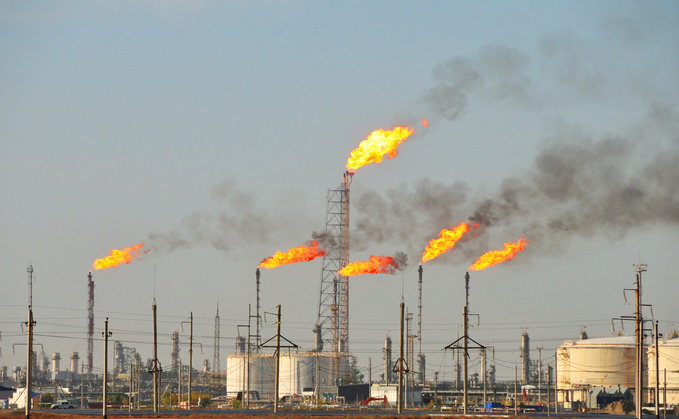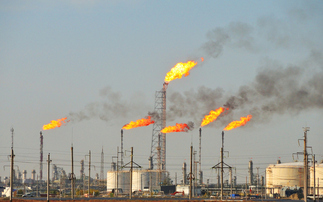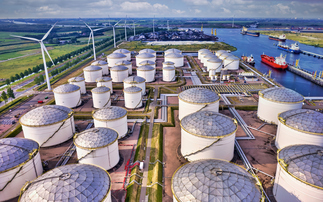
Credit: iStock
InfluenceMap analysis highlights the top CO2 emitting fossil fuel and cement companies since hundreds of countries signed up to the Paris Agreement at the end of 2015
The vast majority of global CO2 emissions produced since hundreds of countries signed up to the Paris Agreement at the end of 2015 can be traced to just 57 fossil fuel and cement producers, fresh research released today has claimed.
The research, published today by InfluenceMap, quantifies the contribution of the world's largest oil, gas, coal and cement producers to global carbon emissions, concluding that just 57 corporate and state entities can be linked to 80 per cent of fossil fuel and cement CO2 emissions from the start of 2016 through to the end of 2022.
Nation-state producers were found to account for 38 per cent of emissions since the Paris Agreement, while state-owned entities account for 37 per cent, and investor-owned companies account for 25 per cent, according to InfluenceMap.
And, far from slowing down, most fossil fuel and cement producers in the study are also increasing production, said InfluenceMap's programme manager Daan Van Acker.
"InfluenceMap's new analysis shows that this group is not slowing down production, with most entities increasing production after the Paris Agreement," he said. "This research provides a crucial link in holding these energy giants to account for the consequences of their activities."
The research is based on the 'Carbon Majors' database, which contains emissions data from 1854 through 2022. InfluenceMap, which is now set take over hosting of the online database, described it as "the first and only provider of this comprehensive view of corporate fossil fuel producers' contributions to greenhouse gas emissions".
Based on this historic data, the research found that more than 70 per cent of global fossil fuel and cement CO2 emissions since the industrial revolution can be traced to corporate and state producing entities.
Over the same period, it also found that just 19 entities contributed to 50 per cent of these CO2 emissions.
"The Carbon Majors database is a key tool in attributing responsibility for climate change to the fossil fuel producers with the most significant role in driving global CO2 emissions," added Van Acker, who said the data set had proved crucial for holding fossil fuel producers to account for their climate impacts.
The leading emitting investor-owned fossil fuel companies since the Paris Agreement were found to be ExxonMobil followed by Shell, Chevron, BP and Total.
The top emitting state-owned companies, meanwhile, include Saudi Aramco, Russia's Gazprom, Coal India, the National Iranian Oil Company, the China National Petroleum Corporation (CNPC) and the Abu Dhabi National Oil Company (ADNOC).
The majority of fossil fuel companies were found to have totalled higher production in the seven years after the Paris Agreement compared to the seven-year period before, with the analysis showing that 65 per cent of state-owned companies and 55 per cent of investor-owned companies produced more emissions in 2016-2022 than during 2009-2015.
That post-Paris Agreement increase in emissions was found to be most prevalent in Asia, where five investor-owned companies and eight state-owned entities were linked to higher emissions in 2016–2022 compared to 2009-2016 in the research, which InfluenceMap said was primarily shaped by rising emissions from Asian coal production.
Elsewhere, the research also found that coal supply since 2015 has largely shifted from investor-owned to state-owned entities, with investor-owned coal production CO2 emissions having dropped by almost 28 per cent - 939 million tonnes - between 2015 and 2022. At the same time, it found that emissions from nation-state and state-owned coal producers grew by 19 per cent (2,208 MtCO2e) and 29 per cent (343 MtCO2e) respectively.
Tzeporah Berman - international program director at campaign group Stand.earth and chair of the Fossil Fuel Non-Proliferation Treaty campaign - said the research "shows us exactly who is responsible for the lethal heat, extreme weather, and air pollution that is threatening lives and wreaking havoc on our oceans and forests".
"These companies have made billions of dollars in profits while denying the problem and delaying and obstructing climate policy," she said. "They are spending millions on advertising campaigns about being part of a sustainable solution, all the while continuing to invest in more fossil fuel extraction."
Chevron, ExxonMobil, BP, ConocoPhillips, Saudi Aramco and Gazprom were all considering requests for comment on the research findings at the time of going to press.
Meanwhile, Shell did not comment directly on the research findings, but in a statement insisted it was committed to achieving net zero emissions across its business by 2050 in line with the Paris Agreement.
"Shell is committed to becoming a net zero emissions energy business by 2050, a target we believe supports the more ambitious goal of the Paris Agreement to limit global warming to 1.5°C above pre-industrial levels," it said in a statement. "We continue to make good progress on our climate targets, and by the end of 2023, we had achieved more than 60 per cent of our target to halve Scope 1 and 2 emissions from our operations by 2030, compared with 2016."
"Shell continues to be a significant investor in the energy transition, investing $10-15bn between 2023 and the end of 2025 in low-carbon energy solutions," it added. "Our investments in new technologies are helping to reduce emissions for Shell and our customers."
Want to understand what is going on at the cutting edge of sustainability? Check out BusinessGreen Intelligence - the premier information for professionals focused on the UK's green economy.






